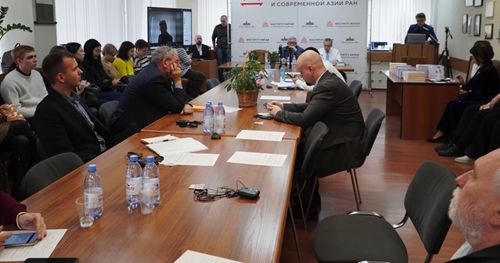Held both in in-person and online formats, it brought together Vietnamese researchers in Russia, young scientists of Vietnam and China, and experts from other specialized fields, kick starting a series of activities to celebrate the 75th anniversary of the Vietnam – Russia diplomatic relations.
The biennial seminar aimed at collecting important and necessary orientations and topics of interest in Vietnam studies in Russia, contributing to maintaining and developing high-quality research in this area, and serving as a forum to attract Vietnam studies scholars.
    |
 |
|
The seminar brings together Vietnamese researchers in Russia, young scientists of Vietnam and China, and experts from other specialized fields. |
Addressing the seminar, Ekaterina Koldunova, Director of the ASEAN Center at the Moscow State Institute of International Relations (MGIMO), remarked that Vietnam recently recorded significant achievements in political stability and is on a path of economic development after challenges posed by the COVID-19 pandemic, positively contributing to international and regional organizations.
According to her, the task for Vietnam studies researchers today is to analyze and understand these processes in Vietnam, serving both policy-making and academic research.
The two-day event focuses on 32 reports, grouped into research areas such as history, politics, economy, and culture of a modern and deeply traditional Vietnam.
Regarding politics and foreign policy, young scholars from Lomonosov Moscow State University (MGU), the Institute for US and Canadian Studies of the Russian Academy of Sciences, and the University of Social Sciences and Humanities - Vietnam National University - Hanoi have presented on current issues such as Vietnam's role in cooperation with countries in the Southern hemisphere in the context of the formation of a new world order; Vietnam's soft power resources; and how Vietnam balances its relations with global powers. Policies related to anti-corruption, smart city development, and ethnic policy are also key topics of interest at the seminar.
Dr. Vladimir Mazyrin, Director of CVAS, noted that over recent years, there have been many positive changes in Vietnam studies as the topic has attracted not only Vietnamologists but also experts from other fields.
In some ways, the participation of "non-Vietnam studies" experts has made the work of Vietnam studies more diverse, aiming for greater depth and specificity, he said.
Meanwhile, Elena Nikulina, a veteran expert in Vietnam studies from CVAS, noted that over recent years, researchers have become more interested in Vietnam's international policies and economy.
Driven by Vietnam's growing position on the international stage and its economic development achievements, Russian scholars are increasingly focused on Vietnam's foreign policy, particularly the philosophy of "bamboo diplomacy" which is currently attracting global attention, as well as Vietnam's reputation in the region and worldwide, she said, adding that Russian scholars are especially interested in Vietnam's domestic policies, with analyses being conducted in a more multidimensional and diverse manner.
Celebrating Vietnam's rising status, Russian scholars said they pin high hopes on the fruitful cooperative relationship between Vietnam and Russia in the coming time, and expressed their belief that cooperation will serve as a motivation and encouragement for scholars who are continuing to lay the scientific groundwork for the traditional friendship between the two countries.
Source: VNA